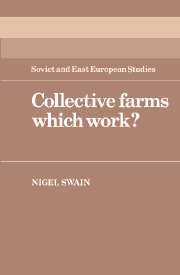Book contents
- Frontmatter
- Contents
- Preface
- Introduction
- PART I ‘FAMILY LABOUR’ AND ‘SOCIALIST WAGE LABOUR’ IN HUNGARY'S CO-OPERATIVE AGRICULTURE: THE INCORPORATION OF PETTY COMMODITY PRODUCTION
- PART II MEMBERS AND MANAGERS
- PART III MANAGERIAL CONTROL IN AGRICULTURE
- Conclusion
- Appendix I The transformation of Hungarian agriculture
- Appendix II Ancillary enterprises within agricultural co-operatives: number of units engaged in non-agricultural activity
- Notes
- References and bibliography
- Index
Introduction
Published online by Cambridge University Press: 10 December 2009
- Frontmatter
- Contents
- Preface
- Introduction
- PART I ‘FAMILY LABOUR’ AND ‘SOCIALIST WAGE LABOUR’ IN HUNGARY'S CO-OPERATIVE AGRICULTURE: THE INCORPORATION OF PETTY COMMODITY PRODUCTION
- PART II MEMBERS AND MANAGERS
- PART III MANAGERIAL CONTROL IN AGRICULTURE
- Conclusion
- Appendix I The transformation of Hungarian agriculture
- Appendix II Ancillary enterprises within agricultural co-operatives: number of units engaged in non-agricultural activity
- Notes
- References and bibliography
- Index
Summary
In recent years it has become part of the received wisdom of students of Eastern Europe that Hungarian agriculture has been a ‘success’. The question mark of the title does not seek to question this view as it is normally understood. Hungarian agricultural policy has been a ‘success’ in economic terms. While it is accepted that Hungarian agricultural production itself is not especially efficient, overall agricultural policy has led to a situation in which the Hungarian population is well fed; there is extensive consumer choice in agricultural products; and, most important, scarce foreign currency is not squandered importing grain and animal feed which can be home-grown. And collectivisation has been a ‘success’ in terms of social policy. This agricultural self-sufficiency was achieved without the need to resort to mass starvation or deportation and, although living standards generally are stagnating in the early 1980s, the rural population really has ‘never had it so good’. One central concern of this book is to consider aspects of how this ‘success’ was achieved, to analyse the Hungarian experience suggesting ways in which collectivisation can be made to work and so rescue it as a serious option for nations developing under the banner of socialism. To countries faced with rural underdevelopment, underemployment and poverty, collectivisation can seem an attractive ideal: the Hungarian experience shows that there is no historical imperative to follow Soviet precedent. Collectivisation has suffered too long under the shadow of the Soviet experience. Collective farms can work, and the Hungarian experience shows one way how.
- Type
- Chapter
- Information
- Collective Farms which Work? , pp. 1 - 22Publisher: Cambridge University PressPrint publication year: 1985



